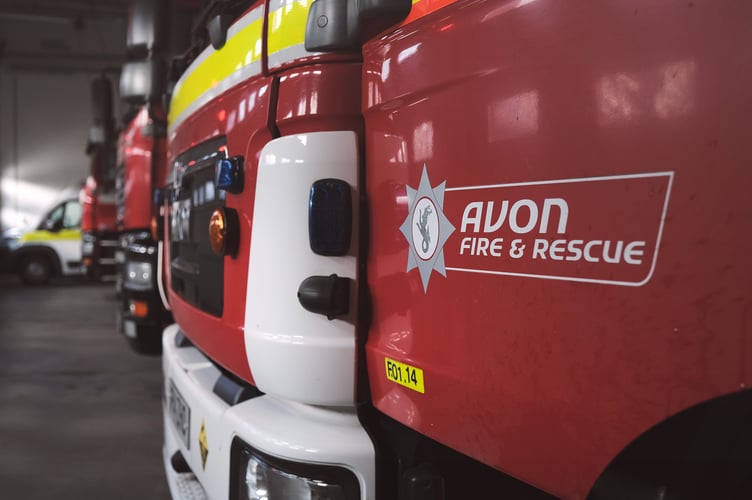Avon Fire & Rescue Service (AFRS) is “inadequate” at responding to emergencies – the worst possible rating, a damning report has found.
His Majesty’s Inspectorate of Constabulary and Fire & Rescue Services (HMICFRS) has “serious concerns” about how the organisation keeps people safe and secure from fire and other risks.
AFRS’s mobilisation system, which records information and dispatches firefighters and fire engines to incidents, “isn’t reliable and crashes during 999 calls, which results in the public receiving a slower response to emergencies”, inspectors found.
The report by HMICFRS inspector Wendy Williams, published today (Wednesday, November 22), says the service does not have an effective system to gather and record relevant and up-to-date risk information, including details of tower blocks, to help protect firefighters, the public and property during an emergency.
Ms Williams raised concerns about the way the service prevents fires and other risks after finding that residents at greater risk from fire were not prioritised for home safety visits, which were decided instead on location and convenience.
She was also concerned about AFRS’s culture and said staff in some teams demonstrated “unacceptable behaviours, such as using sexist or inappropriate language and disguising this as banter”.
“And, worryingly, some staff don’t have the confidence to report these issues,” the inspector’s report added.
Government watchdog HMICFRS assessed how well AFRS performed in 11 areas and rated it as inadequate in four – understanding fire and risk, preventing fire and risk, responding to fires and emergencies, and promoting values and culture.
Five others “require improvement” – the second lowest of five gradings – and two were judged to be adequate, with none “good” or “outstanding”.
As a result, the inspectorate has placed the service in an enhanced level of monitoring to help it address “causes of concern”.
Avon Chief Fire Officer Simon Shilton has apologised and says steps are already being taken to make improvements.
He said: “There can be no denying that His Majesty’s Inspectorate of Constabulary and Fire & Rescue Services’ inspection report into the service makes for uncomfortable reading.
“That said, as a service we welcome the challenge and support to ensure we are the best service we can be, however, I’m sorry if local people feel let down.
“I accept these are the Inspectorate’s findings, and I want to reassure our local communities we have already put plans in place to address some of the concerns raised.
“It is disappointing, despite the hard work undertaken by our staff to deliver the best possible service to our communities, it’s clear the pace of change has not been sufficient against the challenging financial and political backdrop we’ve faced this past year.
“There is more to be done to tackle and improve on the areas highlighted going forward, particularly in relation to our provision of risk critical information and in creating a more inclusive culture.
“However, I feel strongly that the findings do not represent who we are as a service.”
AFRS said it had already addressed concerns over the reliability of its mobilising system software, which is used by about 80 per cent of UK fire and rescue services.
It said the organisation continued to meet its response standards and that the inspectorate’s report acknowledged it had effective arrangements for dealing with multi-agency incidents.
Avon Fire Authority chair Cllr Brenda Massey said: “On behalf of the fire authority, it is regrettable that these are the Inspectorate’s findings, despite how much work staff have put into making continual improvements across the service since the last inspection.
“It’s important our local communities know and have confidence the service will respond to them in an emergency.
“However, the Inspectorate has highlighted areas for improvement and the authority and I will continue to work with the chief fire officer and the service to ensure pace of positive change, working together to ensure the necessary improvements and progress are made and reported on.”
CFO Shilton said cultural challenges were also being addressed, including leadership training and an external review into the handling of past staff complaints, grievances and discipline cases.
He said: “We recognise there is more work to do and, while we may not be able to fix the past, we are focused on improving current staff experiences and ensuring a supportive and inclusive organisation where our staff can thrive – and one where we maintain the public’s confidence in us as a service.
“As an organisation, we are truly committed to continuous improvement and to be there for you, our local communities, as and when you need us most.
“We have made, and continue to make, significant changes – implementing initiatives, systems and support mechanisms to make our communities safer and make our service stronger.”
AFRS has drawn up an action plan based on the report’s recommendations.
The report said the organisation had “no response strategy” to fires and other emergencies.
On the mobilisation system, the report said: “We were concerned to hear about a particular ambulance service request for an emergency response to a serious road traffic collision.
“While the fire control operator was recording the information to dispatch resources, the system crashed.
“This resulted in the fire control operator having to use a different console and restart the whole process as other operators were busy taking other calls.
“These concerns have placed unnecessary stress on fire control staff.
“We were told that multiple health and safety ‘near miss’ forms were completed to report this issue as it has adversely affected staff welfare, but these have been overlooked or ignored.
“At the time of our inspection, the service told us that the mobilisation system had crashed or frozen on 20 occasions in the past 12 months.
“But members of staff told us this has happened many more times and some staff have stopped reporting the problem.
“Worryingly, at the time we discovered these problems, they hadn’t been appropriately escalated and prioritised and weren’t on the service’s corporate risk register.
“The service has limited plans in place to address them.”
It said not all incident commanders had been assessed regularly and properly, “so the service can’t assure the public that it can safely, assertively and effectively manage all the incidents it could face”.
The report said firefighters could not always access risk information, including for high-risk, high-rise buildings.
“Concerningly, we were told by firefighters that on one occasion when they were reviewing the risk information on their way to an incident, a completely different building was displayed that had no relevance to the incident they were attending.
“We were also told of an occasion when firefighters attended a fire on a ship.
“The risk information record said it had two floors and a slated roof, which was clearly inaccurate.
“Concerningly, some operational staff told us it was more of a risk to use the risk information during their response.”
The inspection took place in June and July, and the service will be reinspected next month to review progress.
LDRS, Adam Postans



